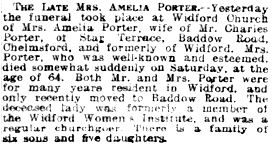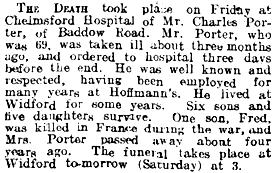Fred Porter was born and brought up in Widford. He worked for Crompton’s, became a Territorial before the war and was mobilised at its outbreak. He went overseas in July 1915, landing in Gallipoli the following month. There he became ill and as a result he was evacuated home to recover. After that he returned to the army to serve in France where he was killed in action in August 1918. His home was in Widford.
Fred was born in Widford on 11th July 1895, the son of Charles Porter (1860-1928) and Amelia Porter (nee Blackburn) (1860-1925). His parents had married in 1880.
Fred was baptised at St. Mary's Church in Widford on 18th August 1895. His eleven siblings included: Agnes Mary Evelyn Porter (1880-1961), Ella Porter (1883-1954), Charles Thomas Porter (1885-1952), Arthur James Porter (born 1887), James Porter (1890-1963), Constance Porter (1892-1957), Bertha Amelia Porter (1896-1979), Dorothy May Porter (1899-1930), George Porter (born 1901), and Harry Porter (born 1904).
In 1901 six year-old Fred was recorded by the census living with his parents and six siblings in Widford. At the time his father was a gas stoker, presumably at Chelmsford's gas works.
A decade later Fred, then aged 15, was listed by the next census at 1 Widford Street, Widford, a cottage between the village’s Post Office on one side and the village grocer’s shop on the other side (close to the modern-day site of 64 Widford Road, and then adjacent a blacksmith’s. He was living there with his parents and four younger siblings. He was an apprentice turner at Crompton's 'electric lamp works'; while his father was a general labourer at the Chelmsford ball and roller bearings' manufacturer Hoffmann's.
Prior to the First World War Fred enlisted into the 5th Battalion of the Essex Regiment where he served as Private 1471. The battalion was a Territorial unit formed in 1908 with its headquarters in Market Road, Chelmsford, and it contained many Chelmsford men who were wounded or lost their lives in the war.
At the outbreak of the war Fred’s battalion and the other Territorial battalions that formed the Essex Brigade were half way through their fortnight’s annual training at Clacton. On 3rd August 1914, the day before war was declared, Fred’s battalion was initially ordered back to Chelmsford, but that was countermanded and the battalion marched for Dovercourt that afternoon. The following day mobilization papers were issued to all ranks and the battalion was alloted part of a pre-arranged defensive line west of Dovercourt.
On 9th August 1914 the battalion was sent to Brentwood. It did not stay there long, moving to north-east Norfolk by the end of the month. In April 1915 it moved to West Bergholt, before transferring to St. Alban’s in Hertfordshire the middle of the following month. By then the battalion, along with three other Essex Territorial battalions formed the 161st (Essex) Brigade in the 54th (East Anglian) Division. The majority of the period since the outbreak of the war had been spent training in expectation of foreign service.
From St. Alban’s the battalion travelled to Devonport by train, and departed on board the S.S. Grampian on 23rd July 1915, with a somewhat depleted strength of 29 officers and 649 other ranks. Its ultimate destination was to be Gallipoli, Turkey to join the Allied forces participating in the campaign against the Turks which had started on 25th April 1915.
Stops were made at Malta and Alexandria in Egypt, before sailing to Mudros Bay on the small Greek island of Lemnos. From there the battalion, including Fred, sailed towards Gallipoli, transferred to flat-bottomed boats and were put ashore at A Beach, Suvla Bay on 9th August 1915 as reinforcements to troops that had landed there over the previous three days.
The 1/5th Battalion of the Essex Regiment had a difficult time in Gallipoli, making little progress against the Turkish Army. With the failure of the Gallipoli campaign it was withdrawn from Anzac Cove on 4th December 1915; its strength reduced by then to 13 officers and 141 other ranks, of whom six officers and 100 other ranks had served throughout the 17 weeks in Gallipoli.
In November 1915 the Widford Parish Magazine reported that Fred was one of those who became ill in Gallipoli:
PORTER, FRED,
Corporal, 10th Battalion, Essex Regiment (formerly of the 5th Battalion, Essex Regiment)
“News has reached us of the illness of four of our Widford young men at the Dardanelles - F Coleman, F Waylett, F Porter, and H Usher. The mothers of F Coleman and F Porter have visited their sons in hospital and I can imagine some of their feelings on both sides. these men have had such experiences during the short time they have been out of England. They have been fighting our battles, and we have been remembering and shall remember then in outs prayers. We hope that it means something to them to know that besides at our ordinary services, as we plead the sacrifice of the Cross, we mention them by name.”
The following month the next edition reported that Fred had been home to Widford after treatment in a London hospital. Fred was transferred to the 10th Battalion of the Essex Regiment where he served as Corporal 29354. In October 1917 the Widford Parish Magazine reported that Fred had recently been home on leave.
While with the 10th Battalion Fred was killed in action in France on 8th August 1918, aged 23. On 23rd August 1918 the Essex County Chronicle reported:
“Cpl. Fred Porter, Essex Regt., Lewis Gun section, fourth son of Mr. and Mrs. Charles Porter of Widford, is reported killed in action in France, on Aug. 8th, 1918. He served two years at the Dardanelles, and two years in France.”
On 30th August 1918 the Essex County Chronicle included the following announcement:
"Porter - In ever-loving memory of Corpl. Fred Porter, Essex Regt., killed in action in France, August 8th 1918, aged 23 years, the dearly beloved son of Mr. and Mrs. Charles Porter of Widford.
A devoted son, a loving brother, One of the best that God could lead; He bravely answered his County's call, His life he gave for one and all: Just the far-off grave is the bitterest blow: None but an aching heart can know.”
In September 1918 the Widford Parish Magazine reported:
“Much sympathy is felt for Mr and Mrs C Porter who have suffered bereavement through the death of their son, Corporal Fred Porter, who was killed in action on August 8th. He was one of our former choristers.”
Fred has no known grave and is commemorated on the Vis-En-Artois Memorial in Pas de Calais, France. The memorial bears the names of over 9,000 men who fell in the period from 8th August 1918 to the date of the Armistice in the Advance to Victory in Picardy and Artois, between the Somme and Loos, and who have no known grave. Fred is also commemorated by the war memorial in the churchyard at St. Mary's Church, Widford.
Fred was entitled to the 1914-15 Star, British War Medal, and Victory Medal.
One of his brothers, Arthur James Porter, served in the Royal Artillery.
1 Widford Street became part of the Borough of Chelmsford when parts of Widford were absorbed into an expanded Borough in 1934 - prior to that the boundary between the two had run largely down the centre of what is now Widford Road with the parish on the northern side and the Borough on the southern.
140903

